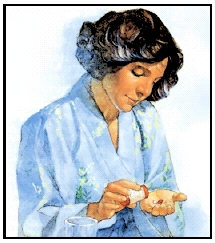Taking Coumadin
Coumadin (warfarin) helps keep your blood from clotting. But it also increases your risk for bleeding. Because of this, it must be taken exactly as directed. You also need to protect yourself from injury.
Follow These Tips

-
Take Coumadin at the same time each day. If you miss a dose, take it as soon as you remember-unless it's almost time for your next dose. If so, skip the missed dose. Do not take a double dose.
-
Go for your blood (protime/INR) tests as often as directed. Note that diet and medication can affect your protime/INR level.
My protime/INR is between _____ and _____.
-
Don't take any other medications without checking with your healthcare provider first. This includes aspirin, vitamins, and herbal and other dietary supplements.
-
Tell all healthcare providers that you take Coumadin. It's also a good idea to carry a medical ID card or wear a medical-alert bracelet.
-
Use a soft toothbrush and an electric razor.
-
Don't go barefoot. And don't trim corns or calluses yourself.
When to Call Your Healthcare Provider
Call your healthcare provider right away before you take your next dose of Coumadin if you have any of these problems:
-
Bleeding that doesn't stop in 10 minutes
-
A heavier-than-normal period or bleeding between periods
-
Coughing or throwing up blood
-
Diarrhea or bleeding hemorrhoids
-
Dark urine or black stools
-
Red or black-and-blue marks on the skin that get larger
-
A fever or an illness that gets worse
-
Dizziness or fatigue
-
Chest pain or trouble breathing
-
A serious fall or a blow to the head
Keep Your Diet Steady
Keep your diet pretty much the same each day. That's because many foods contain vitamin K. Vitamin K helps your blood clot. So eating foods that contain vitamin K can affect the way Coumadin works. You don't need to avoid foods that have vitamin K. But you do need to keep the amount of them you eat steady (about the same day to day). If you change your diet for any reason, such as due to illness or to lose weight, be sure to tell your doctor.
-
Examples of foods high in vitamin K are asparagus, avocado, broccoli, cabbage, kale, spinach, and some other leafy green vegetables. Oils, such as soybean, canola, and olive oils, are also high in vitamin K.
-
Other food products can affect the way Coumadin works in your body:
-
Food products that may affect blood clotting include cranberries and cranberry juice, fish oil supplements, garlic, ginger, licorice, and turmeric.
-
Herbs used in herbal teas or supplements can also affect blood clotting. Keep the amount of herbal teas and supplements you use steady.
-
Alcohol can increase the effect of Coumadin in your body.
Talk with your healthcare provider if you have concerns about these or other food products and their effects on Coumadin.
![]() (727) 259-7818
(727) 259-7818